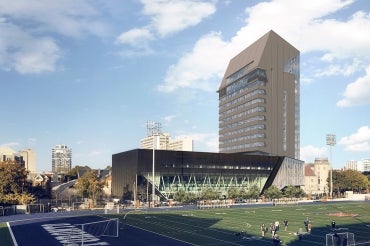U of T constructing Canada’s tallest academic timber building

The Academic Wood Tower has started to take shape in the Bloor Street cultural corridor, where it will serve as a beacon for green architecture – and provide high-quality spaces for three of the university’s faculties and schools (Rendering courtesy of Patkau Architects + MJMA)
Published: January 18, 2024
The University of Toronto has begun raising a new 14-storey mass timber building that will set a precedent for sustainable design.
Once complete, the tower is expected to be the tallest academic timber structure in Canada and one of the tallest mass timber and steel hybrid buildings in North America.
U of T, which was recently named the world’s most sustainable university by QS World Rankings, is committed to furthering its role as a global model with projects like these.
“This inspiring piece of architecture will provide our students, faculty and staff with state-of-the-art spaces for research, learning and community engagement,” said Meric Gertler, president of the university. “It will stand as a testament to U of T’s global leadership in sustainability, as well as our commitment to city-building. It will also showcase Canada’s leadership in wood construction technologies and the forest products industry. We are very grateful to our donors and to all those helping us to realize this incredibly exciting vision.”
State-of-the-art spaces for three U of T faculties and schools
Located near the intersection of Devonshire Place and Bloor Street on U of T’s St. George campus, the tower will provide high-quality spaces for the Rotman School of Management, the Munk School of Global Affairs & Public Policy in the Faculty of Arts & Science and the Faculty of Kinesiology & Physical Education.
Widely considered one of the world’s most innovative business schools, Rotman is home to a unique ecosystem of labs and research centres that provide cutting-edge thought leadership. The top five floors of the Academic Wood Tower will house Rotman’s specialized executive education programs.
“The Academic Wood Tower will provide ample space to inspire our program’s participants as they work to explore and transform themselves, their organizations and their communities,” said Susan Christoffersen, dean of the Rotman School of Management. “Carefully designed to set a precedent in sustainability, space configuration and educational technologies, the tower will equip researchers and learners with the tools and forward-thinking design to educate the leaders of tomorrow on pressing business topics.”
The Munk School of Global Affairs & Public Policy is a world-renowned hub for dialogue and debate, highly sought after for its thought leadership on the most pressing issues of our time. It hosts hundreds of high-impact events each year that engage scholars from across U of T and around the world.
“I’m delighted that the Munk School’s faculty and students will be part of the Academic Wood Tower community,” said Melanie Woodin, dean of the Faculty of Arts & Science. “This new building will provide much-needed space as our experts continue to provide timely research guidance on current events and train tomorrow’s leaders in public policy.”
“We look forward to bringing together students, faculty and other community members in this inspiring space,” added Peter Loewen, professor in the department of political science and director of the Munk School of Global Affairs & Public Policy.
The tower will be directly connected to the Munk School Observatory building and the Goldring Centre for High Performance Sport, one of the Faculty of Kinesiology & Physical Education’s main facilities. The new floors will allow the faculty to continue to expand its work as one of the world’s top-ranked sports science programs of its kind, which includes facilitating the university’s massive slate of co-curricular physical activity and sports programs.
“The Academic Wood Tower will provide critical additional space for our faculty,” said Gretchen Kerr, dean of the Faculty of Kinesiology & Physical Education. “Its proximity to the Goldring Centre and Varsity Stadium will provide us with a fantastic – and convenient – set of facilities as we continue to support healthy living through our teaching, research and programming.”
A highly watched case study in sustainable design
Even prior to construction, the Academic Wood Tower was attracting significant attention for its innovative design.
Designed by award-winning Canadian firms Patkau Architects and MJMA Architecture & Design with consulting from Blackwell Structural Engineers and Smith+Andersen, the Academic Wood Tower’s unique and sustainable structure has already won a Canadian Architect Award of Excellence.
The same team worked on U of T’s Goldring Centre for High Performance Sport, which included the tower’s foundation and basement as part of its construction. Now, with the first deliveries of mass-timber components to the site, construction of the Academic Wood Tower is proceeding under the management of industry leader Pomerleau. The university anticipates completing the building in 2026.
The building is expected to serve as a case study for designers and engineers who can analyze this milestone achievement and potentially apply the tower’s best practices to their own projects.
“U of T’s Academic Wood Tower proves that we can reduce emissions, responsibly construct new buildings and contribute to the vibrant architectural fabric of a dense city like Toronto,” said Sandra Hanington, vice-chair of the university’s Governing Council.
Mass timber offers a wealth of structural advantages, including a high degree of fire safety and a low carbon footprint. Wood naturally absorbs carbon, taking it out of the atmosphere and reducing greenhouse gases. It is also one of the only major building materials that is a renewable resource.
Many of the tower’s components can be manufactured prior to their arrival, which means that they can be assembled easily and efficiently once on site, minimizing the level of construction disruption in this busy area of the city.
Working together on a global issue
Funding the tower’s construction has been a collective effort with the federal government and numerous donors all making key contributions to bring this vision to life.
The building has received significant support from the Government of Canada’s Green Construction through Wood (GCWood) program, which encourages the use of innovative wood-based building technologies in construction projects to help Canada reach its Paris Agreement commitments and reduce greenhouse gas emissions.
Canada is a leader in wood construction technologies and home to one of the largest forest industries in the world. Fittingly, the tower’s timber is homegrown, originating in Western Canada.
“The Government of Canada’s Green Construction through Wood program is supporting more sustainable Canadian materials for the construction industry,” said Jonathan Wilkinson, minister of energy and natural resources. “The University of Toronto’s Academic Wood Tower project is one of many examples of innovative technologies being used to create resilient and low-carbon buildings, while preventing carbon emissions. I congratulate all those involved in this important project.”
“The Academic Wood Tower at U of T is a historic development that symbolizes where we are headed: a cleaner future where Canadian workers sustainably use Canadian materials to build more affordable and sustainable communities,” added Julie Dabrusin, parliamentary secretary to the minister of environment and climate change and to the minister of energy and natural resources. “The Government of Canada is pleased to help get this tower built, right here in Toronto.”
The project’s commitments to sustainability and innovation are an example of the university’s Defy Gravity campaign priorities in action. Donor support has been critical to getting the tower off the ground.
“U of T’s donors make projects of this scale a reality,” said David Palmer, vice-president, university advancement. “Their inspiring commitment has given the world a striking and practical blueprint for building sustainable design – tangibly demonstrating that we can create inviting, cutting-edge research and learning spaces while maintaining our commitment to sustainability.”


